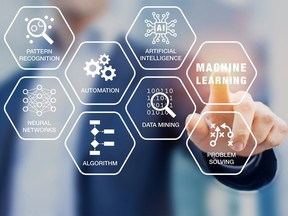
Article content
In our rapidly evolving digital landscape, artificial intelligence (AI) and automation are at the forefront of a technological revolution.
Advertisement 2
Article content
The integration of these technologies across various sectors is not just a futuristic vision but a current reality, redefining the boundaries of innovation and efficiency. AI could contribute up to $15.7 trillion to the global economy by 2030, demonstrating its transformative potential. From improving health diagnostics to revolutionizing transportation with self-driving cars, the applications of AI and automation are vast and impactful. They promise not only economic growth but also an improvement in the quality of life and access to services.
Article content
However, this optimistic view of technological progress is not without challenges and ethical dilemmas. As we adopt these technologies, we must critically examine their implications for employment, decision-making processes, privacy and societal norms.
Advertisement 3
Article content
The impact of automation on employment constitutes an important part of the ethical debate. Automation could eliminate between 400 and 800 million jobs by 2030. This shift is not evenly distributed, with sectors like manufacturing, retail, and transportation most affected. The challenge is twofold: mitigating job losses and exploiting the potential for new job creation. This situation requires adaptive workforce policies, robust reskilling programs, and a focus on developing skills complementary to AI and automation. The conversation extends beyond economic factors to the social and psychological impacts of job losses and the role of governments and organizations in supporting affected workers.
Advertisement 4
Article content
AI’s decision-making capabilities, while impressive, have raised significant ethical concerns, particularly regarding inherent bias. AI systems, trained on data sets that may reflect historical biases, can perpetuate and amplify those biases.
This issue is of particular concern in areas such as recruiting, criminal justice and credit scoring, where biased algorithms could lead to unfair and discriminatory outcomes. The challenge lies in developing AI systems that are not only technically efficient, but also socially responsible. Efforts are being made to include diverse datasets, implement unbiased training practices, and develop transparent algorithms. The goal is to create fair, just and responsible AI systems.
Advertisement 5
Article content
The evolving nature of work in the age of AI and automation presents both opportunities and challenges. According to some predictions, by 2025, machines will perform more work tasks than humans, up from 71% performed by humans in 2020. This shift is not just about automation replacing human labor; it’s about redefining the role of human workers.
The workplace of the future should be a collaborative space where humans and machines complement each other’s capabilities. This evolution requires changes in education systems and corporate training, focusing on skills such as critical thinking, creativity, emotional intelligence and adaptability – areas in which humans have an advantage over machines.
Advertisement 6
Article content
Developing ethical AI is a multifaceted endeavor. This involves creating technologies that respect human rights, societal values and ethical principles. Large technology companies, recognizing the importance of ethical considerations in AI development, have established guidelines and principles to guide their AI initiatives. For example, Google’s AI principles focus on creating beneficial, safe, and responsible AI systems. Likewise, Microsoft is focused on responsible AI, prioritizing fairness, reliability, privacy and security. Beyond corporate initiatives, governments and international bodies are formulating policies and regulations to govern the ethical use of AI. The European Commission’s Ethical Guidelines for Trustworthy AI establish principles to ensure that AI systems are legal, ethical and robust.
Advertisement 7
Article content
The future shaped by AI and automation is full of potential, but also ethical complexities. This requires a proactive and thoughtful approach to ensure these technologies serve the common good. This involves formulating policies that balance innovation with ethical considerations, engaging the public in meaningful dialogue about AI and automation, and reimagining education to prepare future generations. Furthermore, international cooperation is essential to establish global standards for AI, ensuring that its benefits are widely shared and its risks are managed collectively.
In conclusion, as we navigate the uncharted waters of AI and automation, we must do so with an acute awareness of their ethical implications. It is not just about harnessing these technologies for economic gain, but also ensuring that they contribute to a fairer, more just and more sustainable world. Our current approach to AI and automation will shape tomorrow’s society, making it imperative that we proceed with caution, responsibility and an unwavering commitment to ethical principles.
Tim Philp has loved science since he was old enough to read. Having worked in technical fields all his life, he shares his love of science with his readers every week. He can be contacted by email at: tphilp@bfree.on.ca.
Article content


